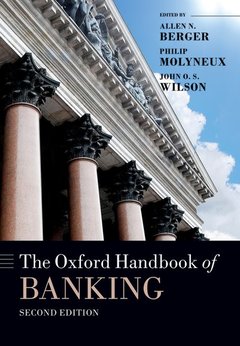Description
The Oxford Handbook of Banking
Oxford Handbooks Series
Coordinators: Berger Allen N., Molyneux Philip, Wilson John O.S.
Language: English
Subject for The Oxford Handbook of Banking:
Publication date: 11-2014
1104 p. · 17.1x24.6 cm · Hardback
1104 p. · 17.1x24.6 cm · Hardback
Description
/li>Biography
/li>
The Oxford Handbook of Banking, Second Edition provides an overview and analysis of developments and research in banking written by leading researchers in the field. This handbook will appeal to graduate students of economics, banking and finance, academics, practitioners, regulators, and policy makers. Consequently, the book strikes a balance between abstract theory, empirical analysis, and practitioner, and policy-related material. The Handbook is split into five parts. Part I, The Theory of Banking, examines the role of banks in the wider financial system, why banks exist, how they function, and their corporate governance and risk management practices. Part II deals with Bank Operations and Performance. A range of issues are covered including bank performance, financial innovation, and technological change. Aspects relating to small business, consumer, and mortgage lending are analysed together with securitization, shadow banking, and payment systems. Part III entitled Regulatory and Policy Perspectives discusses central banking, monetary policy transmission, market discipline, and prudential regulation and supervision. Part IV of the book covers various Macroeconomic Perspectives in Banking. This part includes a discussion of systemic risk and banking and sovereign crises, the role of the state in finance and development as well as how banks influence real economic activity. The final Part V examines International Differences in Banking Structures and Environments. This part of the Handbook examines banking systems in the United States, European Union, Japan, Africa, Transition countries, and the developing nations of Asia and Latin America.
Allen N. Berger is the H. Montague Osteen, Jr., Professor in Banking and Finance, Moore School of Business, University of South Carolina; Senior Fellow, Wharton Financial Institutions Center; Extramural Fellow, CentER, Tilburg University; and Secretary/Treasurer, Financial Intermediation Research Society. He also currently serves on the editorial boards of six professional economics and finance journals. Professor Berger was Senior Economist from 1989 to 2008 and Economist from 1982-1989 at the Board of Governors of the Federal Reserve System. He is also past editor of the Journal of Money, Credit, and Banking, and has co-edited six special issues of various journals and the Oxford Handbook of Banking. He has published more than 100 professional articles, including papers in the Journal of Political Economy, American Economic Review, Journal of Monetary Economics, Journal of Finance, Journal of Financial Economics, and Review of Financial Studies. Philip Molyneux is Dean of the College of Business, Law, Education and Social Sciences, and Professor of Banking and Finance at Bangor Business School, Bangor University, Wales. His main area of research is on the structure and efficiency of banking markets and he has published widely in this area, recent publications appear in the Journal of Money, Credit and Banking, Journal of Banking & Finance and the Review of Finance. In the past has acted as a consultant to: New York Federal Reserve Bank, World Bank, European Commission, UK Treasury; Citibank Private Bank, Barclays Wealth, McKinsey, Credit Suisse and various other international banks and consulting firms. John O. S. Wilson is Professor of Banking and Finance and Director for the Centre for Responsible Banking and Finance at the University of St Andrews, Scotland. His research interests focus on the areas of industrial organization, banking and credit unions. He is Associate Editor to the British Accounting Review, European Journal of Finance and the Journal of Mone
© 2024 LAVOISIER S.A.S.
These books may interest you

The Oxford Handbook of Banking 71.92 €



